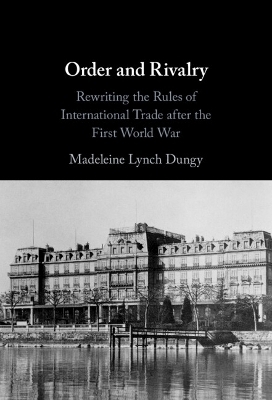
Order and Rivalry
Rewriting the Rules of International Trade after the First World War
Seiten
2023
Cambridge University Press (Verlag)
978-1-009-30890-8 (ISBN)
Cambridge University Press (Verlag)
978-1-009-30890-8 (ISBN)
Order and Rivalry traces the formation and development of multilateral trade structures in the aftermath of the First World War in response to the marginalization of Europe in global markets, the use of private commerce as a tool of military power and the collapse of empires in Central and Eastern Europe.
The First World War transformed the legal and geopolitical framework for international trade by decentring Europe in global markets. Order and Rivalry traces the formation and development of multilateral trade structures in the aftermath of the First World War in response to the marginalization of Europe in the world economy, the use of private commerce as a tool of military power and the collapse of empires across Central and Eastern Europe. In this accessible study, Madeleine Lynch Dungy highlights the 1920s as a pivotal transition phase between the network of bilateral trade treaties that underpinned the first globalization of the late nineteenth century and the institutionalised regime of international governance after 1945. Focusing on the League of Nations, she shows that this institution's legacy was not to initiate a linear forward march towards today's World Trade Organization, but rather to frame an open-ended and conflictual process of experimentation that is still ongoing.
The First World War transformed the legal and geopolitical framework for international trade by decentring Europe in global markets. Order and Rivalry traces the formation and development of multilateral trade structures in the aftermath of the First World War in response to the marginalization of Europe in the world economy, the use of private commerce as a tool of military power and the collapse of empires across Central and Eastern Europe. In this accessible study, Madeleine Lynch Dungy highlights the 1920s as a pivotal transition phase between the network of bilateral trade treaties that underpinned the first globalization of the late nineteenth century and the institutionalised regime of international governance after 1945. Focusing on the League of Nations, she shows that this institution's legacy was not to initiate a linear forward march towards today's World Trade Organization, but rather to frame an open-ended and conflictual process of experimentation that is still ongoing.
Madeleine Lynch Dungy is a researcher at the Norwegian University of Science and Technology.
Introduction; 1. Organizing globalization; 2. The world economy at war; 3. Planning the peace; 4. From bilateral to multilateral trade treaties; 5. Studying the world economy, from Kiel and from Geneva; 6. European unity and security; 7. The International Chamber of Commerce and the politics of business; Conclusion.
| Erscheinungsdatum | 06.06.2023 |
|---|---|
| Zusatzinfo | Worked examples or Exercises |
| Verlagsort | Cambridge |
| Sprache | englisch |
| Maße | 157 x 236 mm |
| Gewicht | 620 g |
| Themenwelt | Geschichte ► Allgemeine Geschichte ► Neuzeit (bis 1918) |
| Geschichte ► Teilgebiete der Geschichte ► Wirtschaftsgeschichte | |
| Sozialwissenschaften ► Politik / Verwaltung ► Europäische / Internationale Politik | |
| Wirtschaft ► Volkswirtschaftslehre ► Makroökonomie | |
| ISBN-10 | 1-009-30890-4 / 1009308904 |
| ISBN-13 | 978-1-009-30890-8 / 9781009308908 |
| Zustand | Neuware |
| Haben Sie eine Frage zum Produkt? |
Mehr entdecken
aus dem Bereich
aus dem Bereich
Europa 1848/49 und der Kampf für eine neue Welt
Buch | Hardcover (2023)
DVA (Verlag)
CHF 67,20
Giordano Bruno - ein ketzerisches Leben
Buch | Hardcover (2024)
C.H.Beck (Verlag)
CHF 41,85


